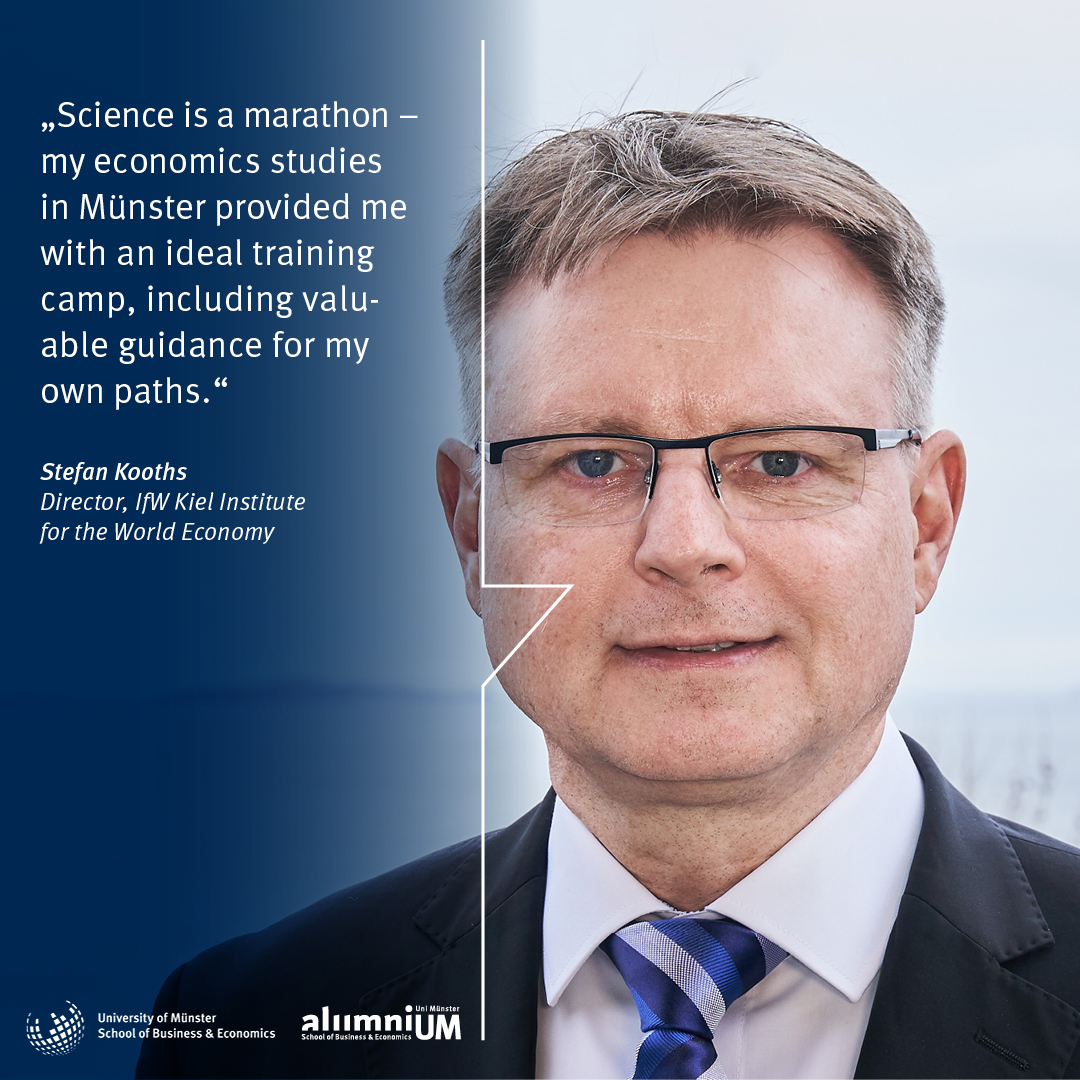Alumni Story: Stefan Kooths

The impact of current events on the German and global economy is a constant topic in the media. In this context, economic forecasters are in high demand, as they serve as generalists among empirically working economists. Not only do they track the driving forces behind economic growth, but they must also assess and classify how macroeconomic shocks shape economic development. At the same time, their advice is sought after to guide appropriate policy responses. Such economic forecasts and corresponding policy recommendations—for Germany, the Eurozone, and the global economy—are developed, among others, by the Business Cycle and Growth Research Center at the Kiel Institute for the World Economy (IfW Kiel).
The director of this research center is Stefan Kooths. After studying economics and earning a doctorate at the Faculty of Economics at the University of Münster, Stefan Kooths spent several years in research and teaching, including serving as managing director of the Münster Institute for Computational Economics (MICE). In 2005, he transitioned into applied economic research, becoming a research director in the Business Cycle Department at the German Institute for Economic Research (DIW Berlin). Since 2010, he has been working at IfW Kiel, where he was appointed chief economist in 2014. Additionally, he is a professor of economics at BSP Business and Law School in Berlin and Hamburg.
In this interview, Stefan Kooths provides insights into the work at IfW Kiel and the art of making good economic forecasts.
Mr. Kooths, you have been working in applied economic research for many years. What has changed the most in your work over this time?
First, let me point out what has remained constant over the years: Reliable economic and growth analyses are always based on a triad of macroeconomic theory, empirical econometric methods, and extensive institutional knowledge of the respective economic area. The ongoing task is to find new indicators that allow us to take the pulse of the economy. Under the buzzword "Big Data," new approaches have repeatedly proven successful in recent years. For instance, during the pandemic, we used satellite images to track pedestrian frequency in city centers as a consumption indicator. Similarly, for the Kiel Trade Indicator, we analyze the position data of all container ships moving across the world's oceans. Currently, we are particularly focused on how energy availability, under the conditions of political decarbonization goals, influences economic development. This represents one of the biggest content and methodological leaps of the past decades—alongside the impact of financial crises.
In recent weeks and months, there has been intense media debate about the future of Germany as a business location. How do you, as an economic forecaster, follow this discussion?
We are part of this discussion and contribute with corresponding growth analyses. The focus is on estimating production potential—that is, the level of economic output achievable under normal utilization of overall economic capacities. Demographics and decarbonization are important drivers in this context, supplemented by in-depth productivity analyses and international comparisons. Medium-term forecasts provide early warning signals for economic policy regarding necessary structural reforms—such as pension policy. Additionally, we help to objectify discussions by illustrating how government spending behavior impacts public capital stock.
As part of your research, you develop concrete policy recommendations. How does it feel when your work is implemented in actual political measures?
First of all, science cannot replace politics. We can examine which instruments are advisable for achieving certain goals and what side effects they may have. However, weighing different objectives must always remain part of the political process—there is no scientific discipline for that. Policy consulting is an important part of our work, which we take very seriously. This also includes educating the public about economic relationships. When I see that our messages are being heard and considered in the political process, I view that as a success. Sometimes, this even leads to concrete legislative proposals. For example, at the beginning of the COVID-19 pandemic, we developed the "Kiel Model" for corporate stabilization aid, which made its way to the Bundestag. Although it did not receive a parliamentary majority at the time, all lawmakers had the opportunity to refine their own rescue proposals based on this model.
Have you and your team ever developed a forecast that turned out to be wrong? How does that impact future forecasting?
Economic forecasters are not fortune tellers. That means a good forecast cannot simply be judged by whether it turns out to be exactly right—that would be a matter of luck given the complexity of economic processes. More importantly, one can be wrong for the right reasons and right for the wrong reasons. What matters is that all relevant information is systematically incorporated into a forecast. However, the world continues to change, and unforeseen events can significantly alter economic developments. In such cases, a good forecast should no longer be expected to materialize. Every serious forecast begins with an error diagnosis, from which we continuously learn. As applied economists, we regularly have a "rendezvous with reality." This grounds our work and continuously provides new impulses for theoretical and methodological research.


